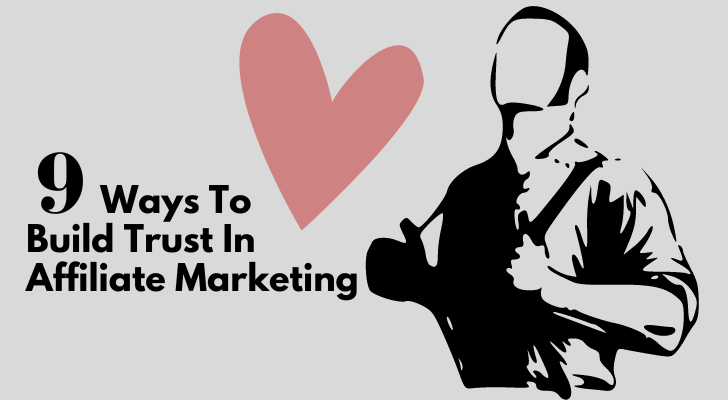It's no secret that affiliate marketing can be a great start for anyone who's considering making money online. Unfortunately, it can also be incredibly difficult to establish the trust of potential customers. Because you know, people can be much more brutal when anonymous behind the internet. You don't trust anyone online, and likewise, they don't trust you. Unless you reveal exactly who you are.
Without being transparent, people are much less likely to buy from you. So today, let's think about how we can focus on building trust in affiliate marketing. What kind of strategies can we use to establish trust? How can we create successful campaigns that boost our profits?

Why Is Trust Important In Affiliate Marketing?
The first and most important step in gaining trust with your audience is to be honest about your purposes. When you are honest about who you are, what you do, and why you do it, you are sharing your authentic story. Whether people like your story or not, so long as it's believable, they are more likely to trust your personality. Being transparent goes a long way in building trust.
You Need To "Appear" Trustworthy
One of the best ways to gain trust is by simply listening to what others have to say. Showing that you are interested in hearing what others have to say and taking the time to listen shows that you care about them and want to build a relationship based on trust.
However, you may have already found out that half of the people you interact with them are selfish time-wasters. They keep asking you for advice, then disappear without a word of appreciation. Or they can be rude to you from the beginning.
Sadly, you cannot simply ignore them because if you do, you may appear to be ignorant to all the other audiences, too.
That's why important not just to be genuinely helpful in your interactions with others but to appear to be helpful too. Many others are looking to hear your advice (even if they are not directly asking you for advice.) People can sense if you are not listening to them seriously, then they may brand you fake or disingenuous, and it will turn them off.
Be real and be yourself. It means that if your audience is not treating you with respect (e.g. rude), you need to be stern with them but still be fairly helpful. Then people will be more likely to trust you.
Product Trust

Product trust is when people trust the products that you are promoting. If you have good reviews and testimonials from past customers, then this can help increase product trust.
Relationship Trust
Relationship trust is when people trust you as an authority figure in your niche. If you build a strong relationship with your audience, they will be more likely to listen to what you have to say and buy products from you.
Brand Trust
Brand trust is when people trust the brand that you are promoting. If you are associated with a well-known and respected brand, then this can help increase brand trust.
All three of these types of trust are important in affiliate marketing. By building all three types of trust, you will be more successful in your affiliate marketing business.
9 Ways To Build Trust With Your Audience In Affiliate Marketing
Remember that you are not just promoting other brands, but also promoting yourself as a brand. This means that you should really be careful about the way you present yourself online and the image you project.
If you're not careful, you could end up damaging your own reputation and credibility. Be professional in everything you do, from the way you communicate with other brands to the way you promote their products. You know that people are becoming more judgemental than ever through social media and all, so make sure that you're representing yourself in the best possible light.
Here are 9 ways to build trust when promoting your affiliate products.
1. Be Transparent About Your Affiliate Status
If you're promoting a product, let your audience know if you're an affiliate or if you're being paid for the endorsement. Let your audience know who you are, what your background is, what you are selling, and why they should trust you. The more information you can share, the better.
Don't try to hide the fact that you're an affiliate; be upfront about it from the start. This is a legal requirement, so you can discreetly disclose it on your website. But it's much more transparent if you openly tell your audience that you are an affiliate.
2. Don't Use a Fake Photo

Hi! My name is Sophie and I work from home. (Photo: Andrea Piacquadio)
Don't use a stock photo for your profile image and pretend that the model is you.
When you're first starting out in affiliate marketing, you may not feel comfortable showing up your face, but that's perfectly normal. You may feel intimidated by the whole online marketing thing. You may not be confident in the way you look.
Or, perhaps you think that you pretend to be a pretty girl so more audiences may engage with you and hopefully buy something?
No, it doesn't work like that in your favor. Using a fake photo can actually do more harm than good. For one thing, we can easily tell a stock photo by doing a reverse-image search. How do they feel? Fake photo = fake person.
If you really don't want to show up your face, use an avatar. Or a logo, or a photo of a landscape. You can create your own persona if you want. Just don't pretend you are somebody else.
3. Create a LinkedIn Profile
Sign up with LinkedIn if you haven't already, to prove your identity. LinkedIn is probably the most credible network because it's most business-related.
Facebook is good too. Instagram or Twitter are less credible in terms of proving your identity because anyone can easily keep creating and deleting as many accounts.
Your social network presence helps you build up credibility and trust with your audience much more quickly.
In other words, creating a social presence is one of the simplest and most effective ways to gain trust. So if you can't do it, or don't want to do it, means you will appear to be hiding something.
4. Believe In The Product Before You Sell
Only promote products that you believe in. If you're promoting a product just because it pays well, your audience will be able to tell and they'll lose trust in you. Promote products that you genuinely believe in and that you would recommend to a friend.
5. Don't Make False Claims
Don't overhype products or make false claims about products. Again, your audience will be able to see right through this and it will damage your reputation and their trust in you.
Be as unbiased as you can and tell them your opinion about the products as a user. All opinions are subjective, so you don't have to try to be over-unbiased though! Just give an honest review of the product and let your readers/viewers make up their own minds.
6. Offer Value
Whether it's through blog posts, videos, or courses, provide your audience with information that will help them make their own decisions about the products they purchase.
Offering value could also mean giving away free resources, providing valuable information on your blog or website, or offering discounts on products. Whatever it is, make sure it's something that will appeal to your target audience and help them in some way.
7. Be Responsive
Be responsive to questions and concerns - means, address them in a timely and helpful manner when asked. Again, how much you help them is up to you, as there are a lot of time-wasters.
8. Have a Well-Designed Website
A well-designed website doesn't mean it has to have cutting-edge features or dynamic elements. It should be built on an up-to-date template. WordPress allows you to create a website without technical knowledge and, if your website displays your profile and contact form, that'll be decent enough to start with.
Just don't use an outdated HTML template - they can often be found for free, but because a lot of them are built using outdated code, which can cause problems down the line, such as;
- They load slowly.
- You cannot add features because they're not compatible.
- Major security vulnerabilities.
- They look unprofessional!
9. Be Consistent and Patient
Trust doesn't happen overnight; it takes time to build relationships and establish yourself as an authority figure in your niche. If you are consistently providing value and delivering on your promises people will begin to see the unpretentious quality in you. They will know that they can count on you to deliver what you say you will. Don't give up if results aren't immediate; just keep plugging away and eventually, you'll see the rewards.



Good post, thanks but not so good thing is that Affiliate marketing is a waste of time for most people. The top earners already have an audience, and these articles don’t acknowledge that it’s nearly impossible for beginners to break in.
So true, thanks for the negative comment!